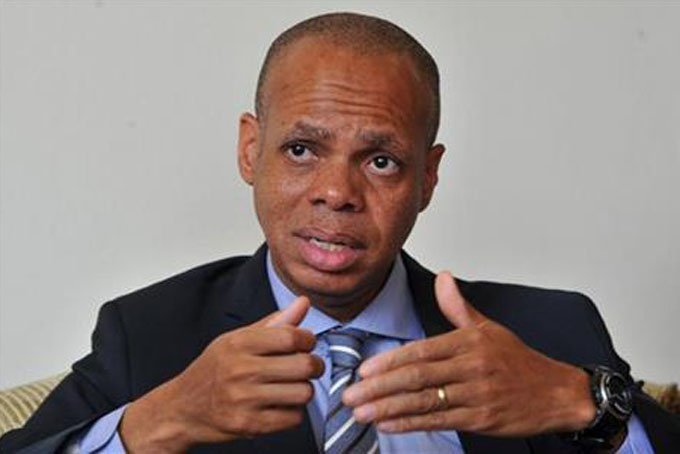
US Ambassador to South Africa Patrick Gaspard is photographed during an interview with a local newspaper in Pretoria, South Africa. (AP Photo)
by Christopher Torchia
Associated Press Writer
JOHANNESBURG (AP) — The new United States ambassador to South Africa says he was a “young kid” when he first met Nelson Mandela, who traveled to the U.S. a few months after he was released from jail in 1990. Patrick Gaspard, now 46 years old, was so enthralled that he ignored the anti-apartheid leader’s simple request in a municipal chamber in New York City.
“I’m standing in the room and I don’t even realize that he and I have been left alone,” said Gaspard, then a lead organizer of the city’s rapturous welcome for Mandela.
“At some point, I hear someone say, ‘Young man, are you OK?’ And I realize it’s him. And I say, ‘Yes, I am.’ And he says, ‘Oh, OK. Well, I’ve asked you for a glass of water. Can I trouble you for a glass of water?’ I was so mesmerized by the presence, of being in his company, that I was being incredibly rude. And I was leaving Madiba there, incredibly thirsty. So I ran and got him that glass of water.”
Gaspard met Mandela a second time in 1991 when New York Mayor David Dinkins led a delegation to South Africa, then struggling to move beyond racial and ethnic conflict as its leaders slowly dismantled the apartheid system.
In September this year, the newly appointed envoy found a very different South Africa, one that wrestles with crime, inequality, corruption and other problems, but embraces the democratic ideals embodied by Mandela, who sought to reconcile South Africa’s factions.
South Africa has challenges but recognizes the strength of its diversity, Gaspard said in an interview with The Associated Press.
“I went to an outdoor food market and saw Black and White South Africans working in partnership in their small enterprises, which absolutely blew me away, because I didn’t see anything like that when I was here two decades ago,” said Gaspard, who was born in what was then Zaire, now Congo, to Haitian parents and moved to the United States as a child.
Like President Obama, Gaspard was inspired by the anti-apartheid struggle. He said in his Senate confirmation hearing in July that South Africa occupies a “central place” in his political development.
He spoke to the AP at a screening this past week of the film “The Butler,” a red-carpet event hosted at a mall by the U.S. Embassy. Based on a true story, the movie stars Forest Whitaker as a White House butler who serves presidents over the decades, chronicling the civil rights era and ending with Obama’s election.
The film features a protest outside the South African embassy in the United States, where a major political battle played out in the 1980s over sanctions legislation that sought to pressure South Africa’s apartheid government into ending its racist policies. The scene was evocative for Gaspard, who was involved in the campaign to push American leaders into imposing economic penalties.
“It feels like yesterday for me that I was standing out in front of that South African embassy with Jesse Jackson and others, performing an act of civil disobedience,” said Gaspard, a former senior White House aide under Obama and a top Democratic Party official. He was also a trade unionist, community activist and city official in New York.
Mandela, now 95, is critically ill and being treated by doctors at his home in Johannesburg after several hospital stays this year. Gaspard spoke of the leadership qualities of a man who sometimes tried to temper the adulation that many felt for him and said he had faults like anyone else.
“You just moved to him and you felt reassured by his steady confidence,” he said. “If he said, ‘Charge,’ you’d follow anywhere.”
Mandela was elected president in the country’s first all-race elections in 1994. South Africa’s transformation is still underway, the ambassador said.
“The United States is over 230 years old and we’re still a country in transition,” said Gaspard, alluding to the recent U.S. government shutdown. “We’re not completely, fully formed, as evident by some of our more recent difficulties.”